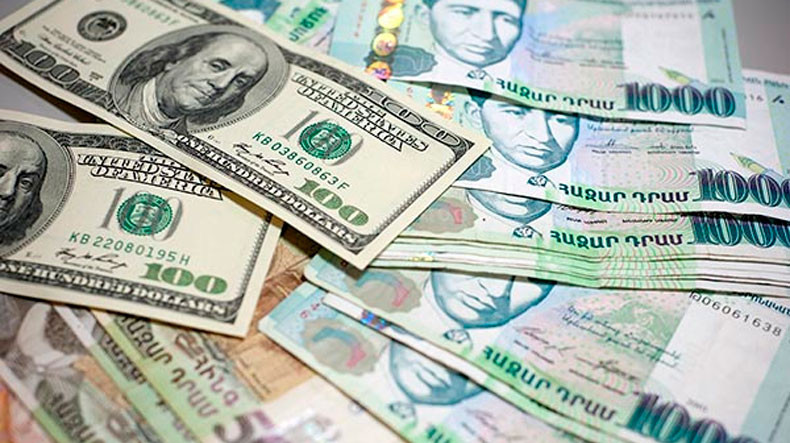
MP Arkady Khachatryan: Devaluation of dram conditioned by uncertainties, recent political developments
After the start of the war in Artsakh, Armenia's national currency, the dram, has been steadily declining.
On September 27, the highest buying rate of a US dollar was 485.32 drams, while it rose to 503.00 drams on Monday, November 23, with the lowest selling rate standing at 509.00 drams. The selling rate of a euro reached 606.00 drams.
The devaluation of the dram could not go unnoticed and it has already affected mainly the prices of imported goods. At present, the prices of primary consumer goods such as flour and butter have increased in the market. The prices of chicken eggs have also risen, which is directly linked to the price of imported feed.
Speaking to Panorama.am, Bright Armenia MP Arkady Khachatryan, Chairman of the National Assembly Standing Committee on Financial-Credit and Budgetary Affairs, attributed the devaluation of the dram to the fact that the financial markets are very sensitive to any uncertainties, instability or unpredictability.
"First of all, it is conditioned by the behaviors of economic entities and individuals, changes in their expectations," Arkady Khachatryan said, adding that in the spring when a state of emergency was declared in Armenia due to the coronavirus epidemic, certain fluctuation was also registered, with the dollar exchange rate reaching 510 drams, but it gradually dropped to the previous rate.
"In this case, we are dealing not only with a decline in economic activity due to coronavirus, but also with a decline in economic activity due to the martial law and increasing uncertainties, unpredictable risks stemming from both this situation and the recent political developments," he said.
According to the lawmaker, all these factors cause uncertainties and risks, to which economic entities and citizens react in a different way, with some of them exchanging drams for dollars, which leads to the devaluation of the dram.
Asked about a possible solution to the problem, Arkady Khachatryan stressed that in such cases it is essential to ensure political stability as soon as possible, which will contribute to the restoration of economic activity and the return of business activities to normal.
Noting that the main task of the Central Bank is to ensure price stability, the parliamentary committee chair emphasized that it targets inflation, not the dollar exchange rate.
"Inflation currently stands at 1.5 percent, it will reach 2.3-2.5 percent by the end of the year, so we have no concerns over the inflation rate at the moment," Khachatryan said.
According to him, the exchange rate is often reflected in the financial market, which can increase instability and inflationary pressure, in particular, creating problems for people whose loans are in foreign currency, increasing the cost of servicing their loans. Arkady Khachatryan pointed to the rise in prices of imported goods among the negative effects of the devaluation.
In the meantime, the MP said that the devaluation of the dram creates favorable conditions for exports.
"We repeatedly state that for the economic development of the country, it is crucial to have export-oriented economic growth, which means that exports must exceed imports at a faster pace. As a result of the mere growth of exports, we will register an increase in gross domestic product. Therefore, export companies should make use of this opportunity, because it creates more favorable conditions for developing their businesses and increasing the volume of exports,” Khachatryan said.
But to do it, according to the MP, it is extremely important that Armenia's economic uncertainty be reduced and the environment become reliable, predictable and stable for business.
"It is necessary to increase economic activity and to bring back the economic life to normal, which necessarily requires creation of an atmosphere of public solidarity and settlement of political instability as soon as possible," the lawmaker stated.
The press service of the Central Bank told Panorama.am that they do not see any significant risks for inflation and financial stability due to the devaluation of the dram, adding if such risks emerge, they will use their tools to counteract them.
In the face of unprecedented negative consequences of the ongoing pandemic and the war, the Central Bank announces that it is not going to interfere in the developments in the foreign exchange market, as stable, low and manageable inflation is registered in Armenia.
The Central Bank considers the devaluation of the dram and the increase in prices normal. If the latter reaches an uncontrollable level, the Central Bank will use its main tool, i.e. it will change the refinancing rate.
Under the current situation, it is not clear how likely it is that the Central Bank will reduce the refinancing rate again. It should be noted that at the October 27 Board meeting, the Central Bank decided to leave the refinancing rate unchanged at 4.25%. It was last lowered to handle the economic impact of the coronavirus epidemic.
At a time when the economies of Armenia and Artsakh were dealt an unprecedented blow by the war, large amounts of resources were invested in hostilities and the coronavirus pandemic persists, only time will tell how adequate the steps taken by the state against the deepening of the crisis are.
Newsfeed
Videos






























